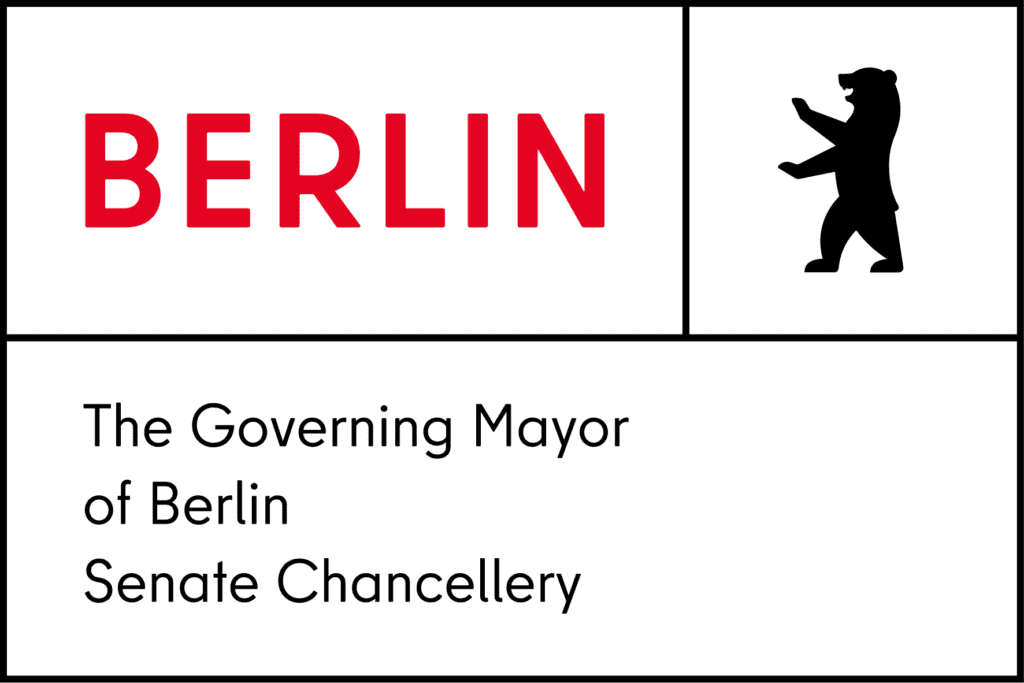Together with the team from the project “Partizipation Digital” (short: PaDi), we have been working on the development of a digital platform for newcomers in Berlin. We’ve learned a lot in the process – and we’d like to share that knowledge with you!
The Challenge: Arriving in Berlin
Every year, tens of thousands of people without German citizenship come to Berlin from all over the world with the intention of staying. The reasons are varied: fleeing from war and terror, seeking better living conditions, or simply the desire to live and work in Berlin. Just as diverse as the newcomers themselves are the information and advisory services aimed at them.
What if the services available for Berliners from third countries are so diverse that it’s hard to get an overview? Especially government services and information can be challenging for newcomers, given their individual needs, language skills, and educational levels. When do I need to go to which authority and with which documents to, for example, extend my residence status or obtain a work permit? These and other questions pose a challenge for many.
We wonder: How can arriving in Berlin be made easier? One of the projects we are supporting in this area is „Partizipation Digital“ (short: PaDi), which is conducted by the project sponsor Minor – Projektkontor für Bildung und Forschung gGmbH and the Berlin Senate Commissioner for Participation, Integration, and Migration. One of the project’s goals is to create a digital information platform that serves as a central point of contact for all newcomers in Berlin and will eventually be part of a new digital welcome center.
This digital welcome center will complement the offerings of the physical welcome center and, ideally, relieve it. One of our core competencies at CityLAB is involving potential users – that is, designing participation processes to develop concepts or prototypes of digital applications. Thus, it was clear to us from the start that we could and wanted to support the project. After a phase of getting to know each other at the beginning of this year, we agreed that CityLAB would support the project team in an initial phase with requirements management for the digital information platform.
The Exploration Phase – Finding the Forest Among the Trees
In May 2024, we officially kicked off with a joint workshop. We met in the afternoon at the Technologiestiftung Berlin and worked on concrete questions while looking out over the picturesque Schöneberg:
- What are the respective project partners’ requirements for the platform, where are the connections and overlaps, and what blind spots still need to be addressed?
- Do newcomers, who mainly network via social media and peer communities, have the same needs as people who visit the physical welcome center?
- How can a platform be designed to address all these different target groups equally?
After hours of discussion and countless Post-Its, we packed work packages to start making progress. Even at this stage, it was clear that we were not yet where we needed to be to define requirements. Our ambitious plan: to identify the requirements for a Minimal Viable Product (MVP) two and a half months later.
In our Handbuch öffentliches Gestalten (handbook on public design), it’s stated: We believe that before tackling a problem (e.g., by creating an MVP), one should first fundamentally address the problem itself. The PaDi team had already begun analyzing the problem, but, as is often the case in larger project teams, knowledge silos and blind spots had formed. But how to overcome these silos?
“We learned that the common goal and the path to it must be continuously articulated – especially in cross-organizational project teams.”
Pauline Boos, Project Manager Administrative Innovation CityLAB Berlin
Now, we had to avoid losing sight of the forest for the trees. So, we dived into two different work packages defined after the workshop.
Our first work package involved consolidating and mapping the existing knowledge of the PaDi team to derive user needs. On a Miro board, CityLAB developed corresponding templates and optimistically awaited the PaDi team’s input – initially in vain. At this point in the process, we had to learn that we still had room for improvement in our communication. We had failed to clearly explain why it was so important to gather and map the collected knowledge – and that this was not a step back but a significant step forward. The “why” was missing in our communication. This prompted us to emphasize our methodological approach even more and present it to the PaDi team in the form of a guide (14 steps to MVP) and specific guiding questions. From then on, things went smoothly: We had a common goal, namely to present concrete insights by the end workshop of this short exploration phase.
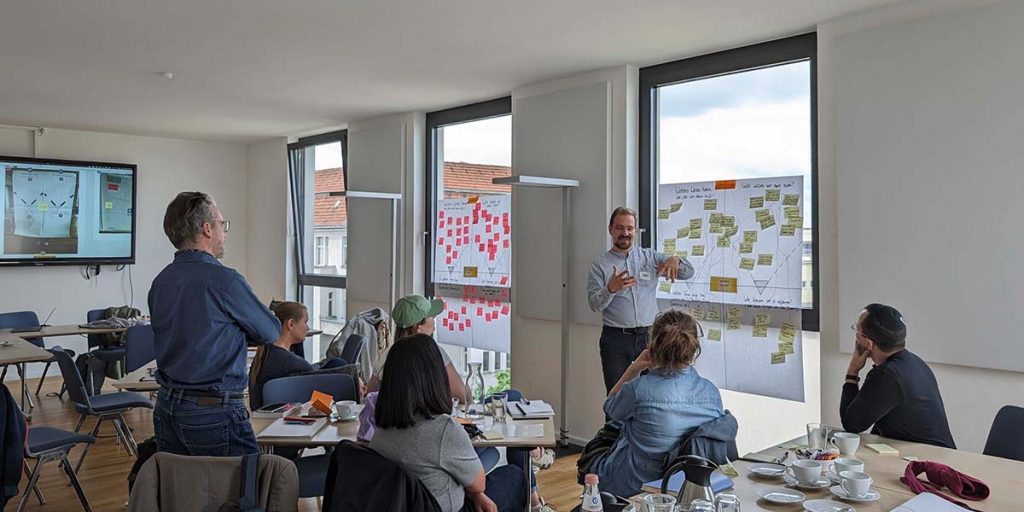
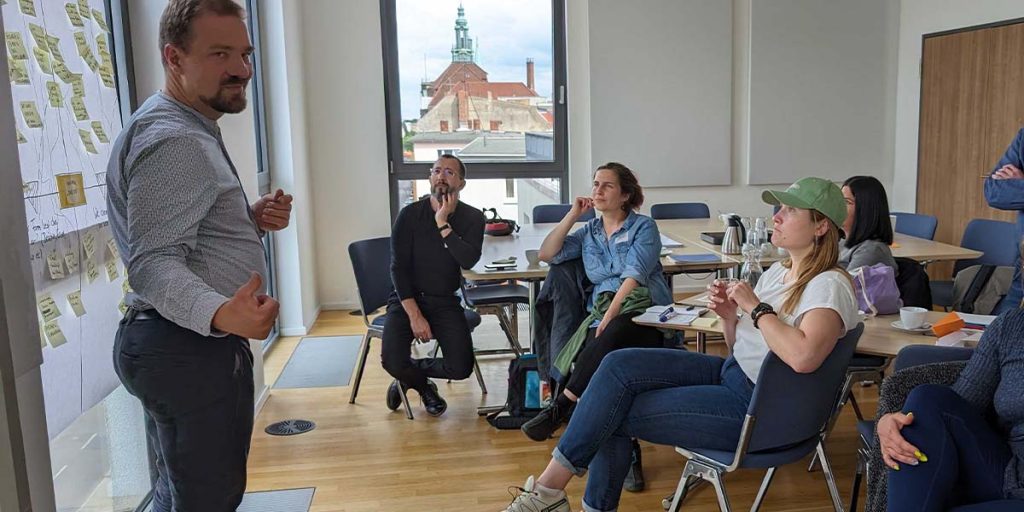
Understanding the Problem – What Should a Digital Solution Help With?
The second work package involved determining the target group of the physical welcome center. The goal was to find out why people visit it and how a digital platform could help avoid a visit. This work package started quickly, with statistics being unearthed and new ones being kept at the welcome center. We spoke with various roles within the welcome center and conducted shadowing with the support of the PaDi team, where we spent a day observing operations at the welcome center. We sat at the language mediators’ table, within hearing and sight of the registration desk, in the waiting area, and observed the processes, conducted interviews, and documented the needs of those involved in detail. We gathered various insights but lacked a detailed visitor statistic, which is planned to be introduced in the future.
In mid-July, we met again – this time in the offices of Berlin’s Integration Commissioner, Katarina Niewiedzial. In our final workshop, we looked back and discussed remaining open questions – and they were significant:
- How can the needs-based solution we envision be technically implemented?
- What organizational steps need to be taken to achieve this?
- It also became clear that some points were still open that needed to be closed for requirements gathering. These concerned the explicit contents.
The phenomenon of “fear of the blank page” – that is, the hesitation to move from all the research to an actual draft – was present in this project as well. This is exactly why we decided to work on concrete concepts on blank pages. One module of the workshop involved paper prototyping, where we captured our visions of a digital welcome center in teams.
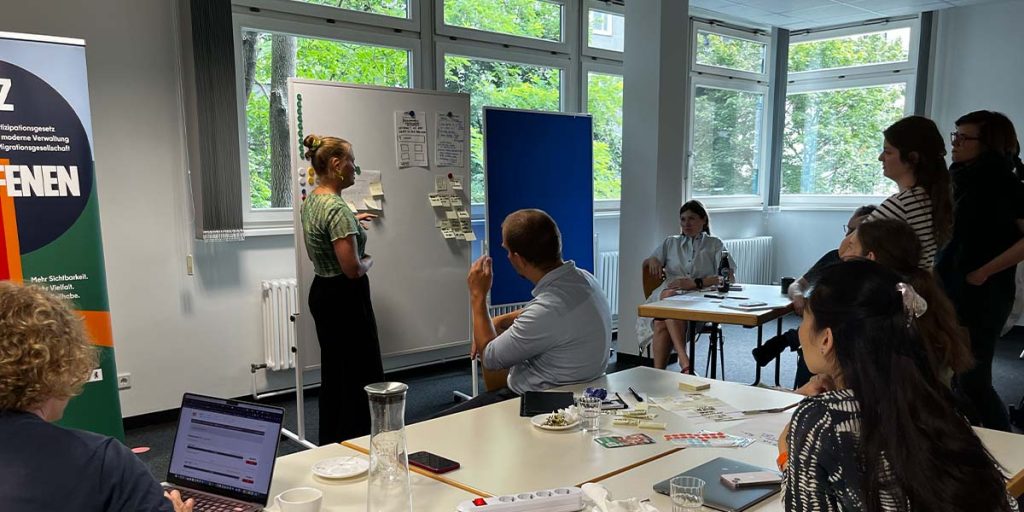
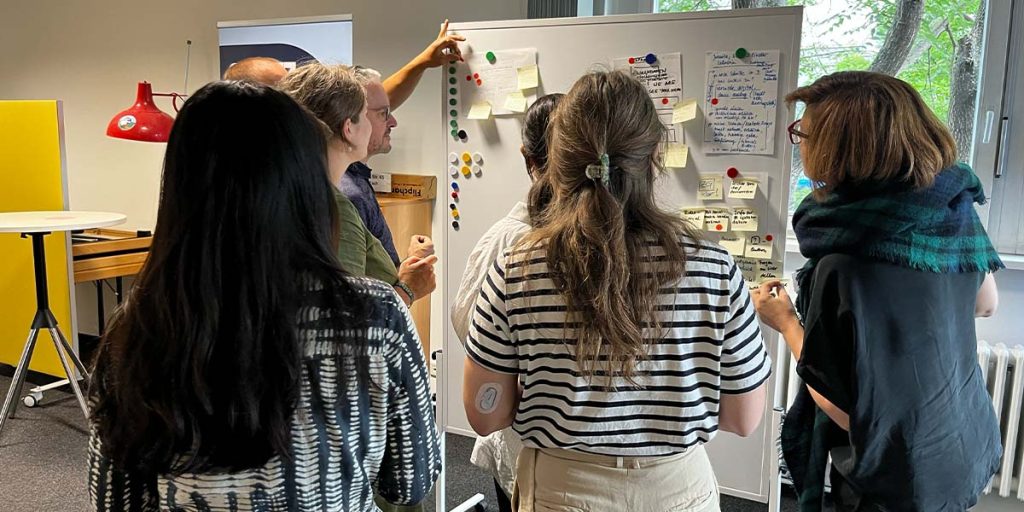
Pulling the Threads Together and Letting Insights Mature
In the end, we left the workshop with great enthusiasm. Although the goals we set were somewhat ambitious, the exchange was fruitful: The PaDi team now has a roadmap for MVP development for the coming months, and we learned a lot as well:
- Even tried-and-true methods should be continuously questioned and correctly applied. For instance, we occasionally forget our credo of transparent communication and need to remind ourselves of it.
- Requirements can be extremely complex and diverse – there is not always one solution for all. This is also true for a digital welcome center aimed at people in all kinds of life situations.
- There are already some creative ideas and user-centered offerings out there – even outside the administration and for our target groups. The question is what needs a particular platform can meet and which it might not.
We say: The story has a real happy ending. At the same time, we are curious about what comes next and at which points in the process the PaDi team and we will meet again to continue working together. We hope this behind-the-scenes look and our guiding questions can also help you with your next project!
